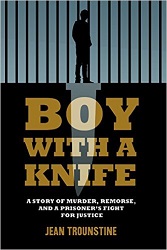
Image courtesy of Social Engagement
It’s time to say it. The paroling rate for lifers in Massachusetts is appalling and not promoting public safety.
Parole is not a free pass. It must be earned, but it is a cornerstone of public policy across the country. It provides the opportunity to serve the rest of one’s sentence in the community. It reunites families, allows returning citizens to be responsible citizens, and helps us to safely integrate prisoners back into society.
The National Institute of Justice has called a healthy parole rate “key” to enhancing public safety, and a policy statement revised by the Massachusetts Parole Board in 2012 made this point: “The most dangerous population in the Commonwealth are the ex-offenders who leave the prison setting from high levels of security without any form of post-release supervision and support.” Additionally, not giving people a chance for parole adds to overcrowded prisons, more dangerous conditions for officers, more despair for the prison population as a whole, and more expense for the taxpayer.
But guess what…Massachusetts’ lifer paroling rate seems built for political reasons and not for what’s best for the Commonwealth, and certainly not for giving people second chances. Why else would a 5 percent lifer paroling rate be in effect in Massachusetts in 2016? This is worse than in 2013, when the Board had a lifer release rate of 18 percent, according to research from a 2013 White Paper on parole, and significantly worse than in 2006 when 40 percent of lifers received positive votes.
I have written about the problems of the Massachusetts Parole Board several times. And every time I have tried to explain why letting out fewer people does NOT make us safer. And why it costs us so much (an estimate of annual recurring costs to keep Massachusetts lifers in prison is now more than $53,000 a year and as prisoners age, it costs even more to house those ill and dying, close to 2 to 3 times that cost says Prisoners’ Legal Services.)
When Governor Deval Patrick was in office, I called him out in 2011 after a police officer was killed by a career criminal who was out on parole, and Patrick caved to public outcry instead of launching a thorough investigation of the case. He forced the exit of five Parole Board members. Additionally, he failed to admit that any man-made system is subject to error. That might have been an unpopular position but it would have been the truth, and while there is no evidence to say that his political future was on the Governor’s mind with this move, it certainly seemed like a political decision.
Then again, when we needed new blood on the Board in 2012, along with many others, I strongly suggested Massachusetts should diversify its Board and add more psychologists and substance abuse specialists—or how about a former parolee instead of a former prosecutor? How about someone from social work or education or sociology? Nope, it didn’t happen. Same old same old. Today we have Chairman Paul Treseler, a 20-year former prosecutor; Ina Howard-Hogan, another former prosecutor; Lucy Soto-Abbe, a victim’s rights advocate; Shiela Dupree from the Department of Correction, Tina Hurley from Parole; and attorney Tonomey Coleman. Only one Parole Board member has experience in forensic psychology and that is Dr. Charlene Bonner.
In 2013, I wrote why Governor Patrick’s attempts to reform parole had only made it worse when I wrote Why Massachusetts’ Parole System Still Requires Reform. Not only have we not diversified the Board, but we are still paying no attention to what other states have found effective.
As I wrote in that article about Michigan, California, and New York: “The best case for parole actually comes from those who have committed some of the worst crimes. According to a 2009 study by the Michigan-based Citizens Alliance on Prisons and Public Spending, parolees originally convicted of homicide reoffended the least of all groups of ex-prisoners. Of 2,558 homicide parolees in that state, only 2.7 percent were returned to prison for any new crime, and only 0.5 percent were returned for another homicide. Other states have observed similar trends. A California report conducted in 2006 to 2007 showed that 51.5 percent of non-lifers on parole received new convictions, whereas only 4.8 percent of lifers did. In New York, just 2.6 percent of 1,480 murderers paroled from 1986 to 2006 were returned to prison for committing new crimes.”
However, it’s a little like screaming into a megaphone that’s on mute.
Here we are in 2016, with a new governor and a new chairman of the Board. Former Suffolk County ADA Paul Treseler was appointed by Governor Charlie Baker as Chairman in September, 2015. It is hard to imagine, I say to myself, that things could have gotten worse, especially if paroling lifers makes us safer. Yes, there is always some risk. However a 5 percent paroling rate for lifers surely implies that someone really really doesn’t want to take any chances— even if that means ignoring that those behind bars who have changed are still doing time for the person they WERE rather than the person they HAVE BECOME (a brilliant way of saying it, courtesy of Dr. Robert Kinscherff, a forensic psychologist who has examined some these lifers as kids and again tested them as adults.)
Since Treseler has been Chair, the Board has issued at least 40 lifer decisions as of May 12, 2016. There have been only two positive votes for parole from those 40 hearings, resulting in the current lifer paroling rate of approximately 5 percent. Ten of those 40 hearings were juvenile first degree lifer hearings. In other words, those were hearings after Miller v. Alabama. and Diatchenko v. District Attorney. They were hearings after the Supreme Court declared that a child is capable of change even if he commits the most heinous of crimes; they were after significant advancements in brain research that has compelled us to consider that many grow out of crime. Not one of the juvenile lifers in the past eight months has received a positive vote for parole. This is in spite of the fact that recidivism among this cohort, when released on parole with supervision and support, is extremely low.
So what to do? First off, we need to educate ourselves on how to talk about the parole problem so we can speak out when openings on the Board arise. Then we need to push for change. Lifer parole hearings are open to the public. Hold the Parole Board accountable. If they continue with a 5 percent paroling rate, you can bet it has nothing to do with what’s best for Massachusetts.



